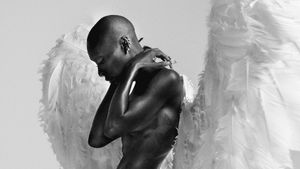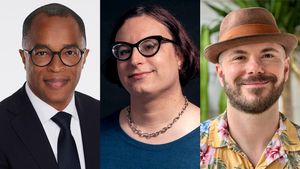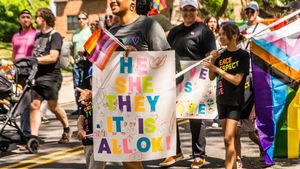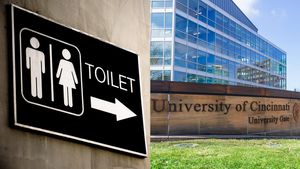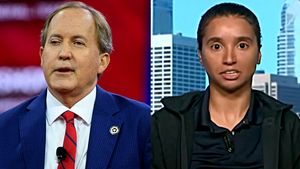@andrewjstillman
CONTACTCAREER OPPORTUNITIESADVERTISE WITH USPRIVACY POLICYPRIVACY PREFERENCESTERMS OF USELEGAL NOTICE
© 2025 Pride Publishing Inc.
All Rights reserved
All Rights reserved
Scroll To Top








By continuing to use our site, you agree to our Private Policy and Terms of Use.
Accept
What is biphobia and why is it such a big problem?
Even within the queer community, we need to do some work!

Shutterstock
Within the LGBTQ lexicon, people who identify as bisexual are often overlooked or told they need to “choose” between being gay or straight. Within that is monosexism, or biphobia, wherein someone believes that monosexuality, or sexual and romantic attraction to only one gender, is superior.
This is wrong for a number of reasons, but it’s important to realize that this belief has an impact on the mental, physical, and sexual health of bisexual individuals.
Let’s take a deeper look into biphobia and its effects.
What's different about biphobia from other sexuality-based phobias?

Shutterstock
Firstly, it should be worth mentioning that some people within the bisexual realm prefer the term “bimisia.” When you use “phobia,” it usually implies acting out of fear, which many believe allows people who act violently to get away with it. “Misia,” on the other hand, means hatred of and aversion to, which allows the blame to stay where it is — on the hater.
More than that, bisexual people are often excluded and treated like they’re invisible within LGBTQ+ spaces and any conversation regarding queer issues. People also assume they’re either gay or straight because of who they’re dating.
What is bi erasure?

Shutterstock
Also referred to as bisexual invisibility, bi erasure is the tendency to ignore or attempt to remove any evidence of bisexuality from history, the media, or the news. This is dangerous for multiple reasons, with the main one being the significantly higher rates of depression, anxiety, sexual assault, and domestic violence bisexual individuals face as opposed to lesbians, gay men, or straight cisgender people.
Although attitudes toward gay and lesbian people have progressed in recent years, unfortunately, the same cannot be said for bisexual people — both heterosexual and homosexual people frequently question bisexual identities.
How does this impact healthcare?

Shutterstock
In the United States especially, healthcare is hard to access, and bisexual people have a lot of barriers when it comes to getting the care they need. Many people within the LGBTQ+ community are more prone to things like unprotected sex and sexually transmitted infections (STIs), and discriminatory practices from healthcare professionals put bisexual people at more of a risk.
This is important because it causes a lot of people in the queer community to avoid healthcare for fear of discrimination, which can also lead to people hiding their sexual orientation to avoid it. Healthcare professionals aren’t always able to treat people in the LGBTQ+ community with the needs they actually need, because they’re more likely to treat them as though they’re heterosexual.
What does biphobia have to do with mental health?

Shutterstock
A 2017 study found that people who are bisexual report higher rates of mental health conditions as opposed to their monosexual counterparts. They’re also more likely to consider suicide due to increased rates of anxiety and depression.
That’s not to touch on the social stress bisexual individuals face as well. Often, this has to do with the discrimination coming from both heterosexual and homosexual people, which makes it harder for them to find a community they feel they belong. This can lead to greater risk of other mental health conditions like eating disorders and causing self-harm.
Plus, bisexual people are more likely to develop substance abuse and are much more likely to rely on mind-altering substances to cope.
What about internalized biphobia?

Shutterstock
Unfortunately, especially with societal perceptions, internalized biphobia is also just as much an issue. This is when a bisexual individual thinks the worst of being bisexual — like it isn’t real or they’re just homosexuals who haven’t realized it yet — and internalize all of that.
This can make bisexual people stay closeted and feel like they’re imposters who constantly doubt their own sexuality. Another example would be something like a threesome occurring, where the bisexual individual thinks they’re “bad” at being bisexual because they’re aligning with the stereotypes.
I'm not bi, but I know someone suffering biphobia. What can I do?

Shutterstock
First of all, thank yourself for not being part of the problem. Second of all, reaffirm their identity anytime you can. Remind them you’re there for them, that they have a purpose, and do your best to uplift them in their darkest hour.
Besides that, encourage them to find other bisexual or polysexual individuals. Finding a community helps the individual learn better or different coping skills, and being around people who experience the same thing also further validates your own experience.
I am bisexual and experiencing biphobia. What do I do?

Shutterstock
Even when it’s hard, you just have to set up boundaries. If it’s coming from people you know and love, consider snipping them out — even if they’re family. If it’s coming from someone you don’t know, do your best to avoid them. If it’s coming from work, talk to your HR team to settle the issue.
There are some times where this will work out easier than others. The discrimination against bisexual people can make finding the support you need a little more challenging, but it isn’t impossible. Just keep your head up and remember you have a purpose and a place in this world, and do your best to avoid internalizing your bisexual identity.
What kind of support exists?

Shutterstock
Fortunately, you are not alone, even if it feels like it. There are plenty of resources out there for you if you need some additional support. These include, but are not limited to:
The world is a hard and scary place to be in, but reach out to those who can help you when you need it. Along your journey, one of the most important things you can do is just eliminate the people in your life who mistreat you as much as possible and do your best to own the skin you’re in, because you’re worth it.
Latest Stories
These 21 rare photos of a gay motorcycle club will forever shift the way you see 1962
April 09 2025 2:01 PM
Sustainable luxury at sea onboard Virgin Voyages' Resilient Lady
February 25 2025 8:33 AM
How each astrological sign reacts to being ghosted
January 27 2025 3:12 PM
Meet the queer icons who are the Real Nasty Pigs of New York
January 14 2025 4:30 PM
10 awkward moments that can happen while you're cruising
January 07 2025 1:24 PM
What to do if you're not kink-compatible with your partner
January 06 2025 11:54 AM
Signs you're actually ready to be friends with your ex
December 30 2024 6:04 PM
French Polynesia: Where LGBTQ+ inclusivity is a way of life
April 07 2025 11:16 AM
Out and About with Karan Soni
April 04 2025 10:14 AM
10 best super bowl halftime performances ranked
February 07 2025 12:27 PM
Remembering the 10 most LGBTQ+ moments from 'Pee-wee's Playhouse'
January 27 2025 12:08 PM
Join Ricky Cornish as he discovers the LGBTQ+ paradise of Thailand
January 14 2025 10:20 AM
25 sexy pics of Nicholas Galitzine our future He-Man
January 08 2025 3:04 PM
Exploring the LGBTQ+ enchantment of French Polynesia
January 07 2025 8:15 AM
Jane Hilton's 'Cowboys & Queens' celebrates the modern American dream
March 28 2025 6:33 PM
25 celebrities who came out as straight
January 31 2025 2:06 PM
We gays love Grindr — but here's why I still refuse to use it
January 13 2025 5:34 PM
Kinky Capital hijinks await you at MAL Weekend 2025
January 07 2025 3:21 PM
15 types of shaming we need to stop now
January 06 2025 3:25 PM
Celebrities with OnlyFans accounts to thirst over
January 02 2025 11:55 AM
Trending Stories
Recommended Stories for You

Andrew J. Stillman
Contributing Writer for Pride.com
Andrew J. Stillman is a freelance writer and yoga instructor exploring the world. Check him out at andrewjstillman.com or follow him @andrewjstillman on all the things.
Andrew J. Stillman is a freelance writer and yoga instructor exploring the world. Check him out at andrewjstillman.com or follow him @andrewjstillman on all the things.























